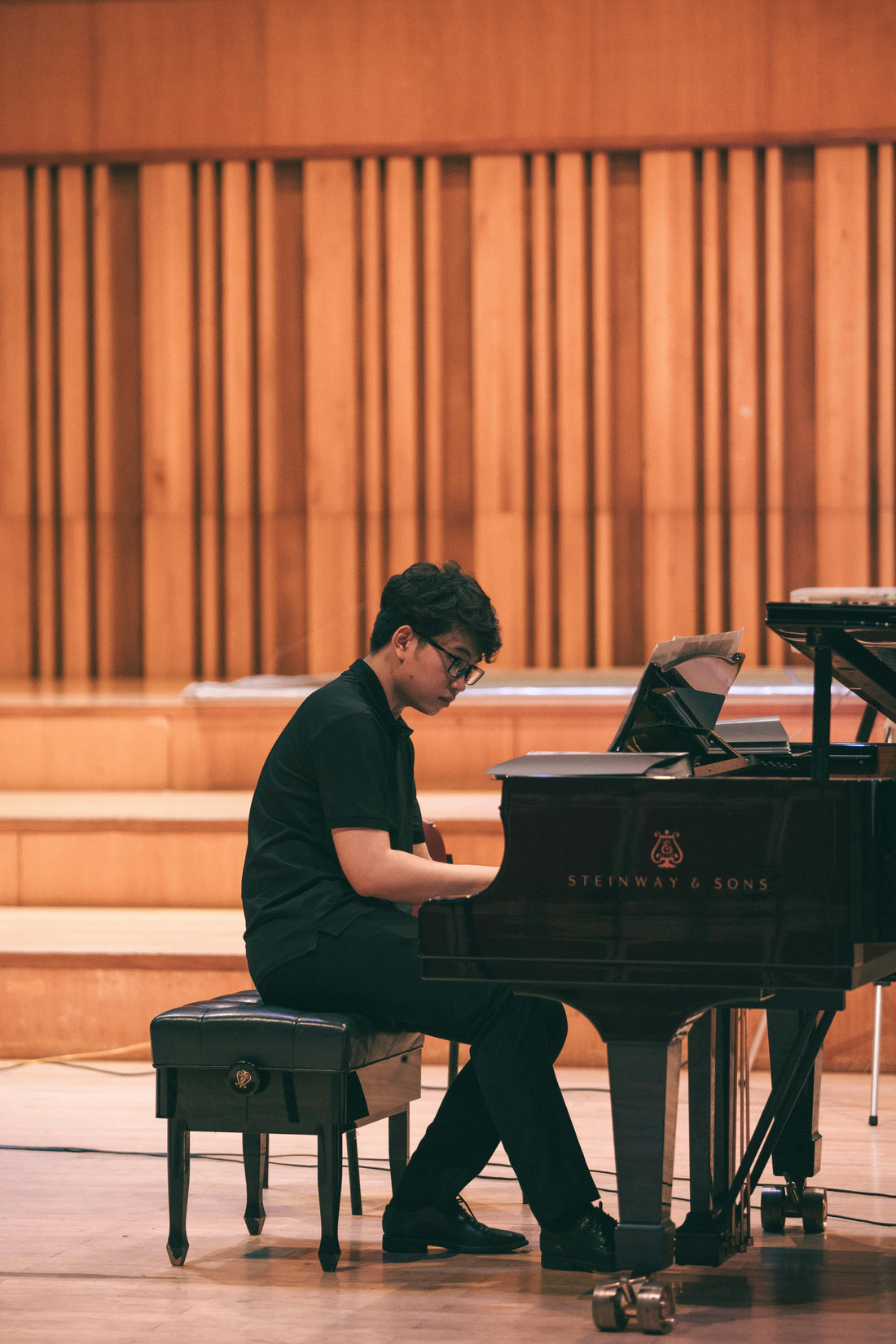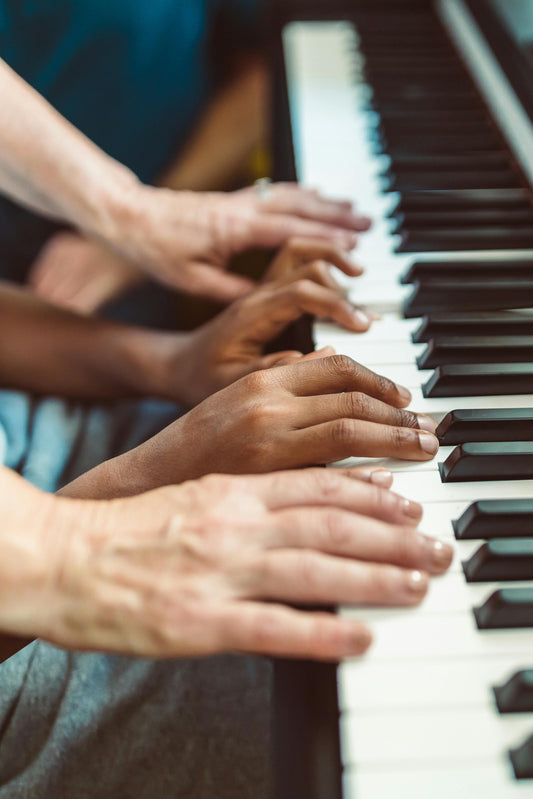
How to Prepare for Your First Piano Recital
Share
Your child’s first piano recital is a big moment, not just for them, but for you as a parent too. There is excitement, of course, but also plenty of nerves. You want to help them feel ready and confident, but you might be wondering how much they should practice. What if they get nervous? How do you make this a positive experience?
These are all natural questions. In fact, they are some of the most common we hear from families at our studio.
A recital is a celebration, not a test
Recitals are not about perfection. They are about progress. Your child is not walking on stage to prove something. They are there to share how far they have come.
At our studio, we see so many wonderful things happen at recitals beyond just playing the right notes. Kids grow in confidence. They learn to set goals and work toward them. They learn what it feels like to be part of a supportive, musical community.
If there are little mistakes along the way, that is okay. Everyone in the audience, from parents to teachers to fellow students, is there to celebrate every child’s courage and effort. Recitals are about showing up, sharing music, and feeling proud.
Choosing the right piece makes a big difference
We take special care in choosing recital pieces for each student. Most of the time, your child’s teacher will select a piece they already know and feel comfortable with. This is important because familiarity builds confidence.
A piece does not have to be difficult to be meaningful. In fact, we often find that simple, well-loved pieces create the most joyful performances. When kids feel connected to the music they are playing, it naturally comes across in their performance.
If you are ever curious about your child’s recital piece or why it was chosen, please ask. We love having these conversations with parents, and it is a great way to stay involved in your child’s musical journey.
Practicing at home for recital success
Good recital preparation is not about practicing for hours at a time. It is about building small, steady habits that help your child feel ready.
Here is what we recommend.
1. Practice full run-throughs
Have your child play their piece from start to finish without stopping, even if they make mistakes. Learning to keep going builds resilience and helps prepare them for performance day.
2. Record practice performances
Recording your child’s practice performance is a great way to help them get used to the feeling of being watched. It also gives them the chance to listen back and hear their progress.
3. Create playful audience moments at home
Especially for younger children, it helps to make practicing feel like a mini performance. Invite siblings, grandparents, or even a few favorite stuffed animals to be the audience. This makes practice fun and helps ease performance jitters.
4. Focus on effort, not perfection
Remind your child how proud you are of their hard work. Even if a practice run has a few mistakes, what matters most is that they are preparing and growing.
If you would like even more tips, be sure to check out our full post How to Support Your Child’s Piano Practice.
Helping your child manage nerves
It is perfectly normal for kids to feel nervous before a recital. Even experienced musicians feel the same way.
The goal is not to eliminate nerves but to help your child understand them and learn how to work through them.
Here are a few simple ways to support your child emotionally.
1. Talk about feelings openly
Ask your child how they are feeling as the recital approaches. Let them know it is okay to feel a little nervous and that many musicians feel the same way before they perform.
2. Look for quiet signs of worry
Sometimes kids express nervousness by avoiding practice or saying they are not ready. If you notice this, gently reassure them that the recital is a time to share, not to be perfect.
3. Reframe the experience
For children who tend to be hard on themselves, it helps to shift the focus. Instead of saying "Play your best," try saying "Enjoy sharing your music."
4. Practice calming strategies
A few slow, deep breaths before going on stage can do wonders for calming the mind and body. Practice this together during home rehearsals so it feels familiar.
5. Keep your own energy calm
Kids are very sensitive to the emotions of the adults around them. If you stay relaxed and positive, your child is more likely to feel the same.
Helpful tips for recital day
Recital day itself is exciting, and a little preparation goes a long way.
Here are a few parent-friendly tips.
- Plan to arrive a bit early so your child has time to settle in.
- Avoid last-minute practice or new instructions right before they play.
- Keep your words light and encouraging. A simple "Have fun sharing your music" works beautifully.
- Remind your child to take a deep breath before they begin.
- Enjoy the experience yourself. Recitals are wonderful milestones for families too.
Our studio recitals are designed to be warm and family friendly. Children are introduced by name, play their piece, and receive supportive applause from the audience. Every performance is met with encouragement, and we celebrate all progress, big or small.
What to expect during the recital
If this is your first piano recital as a family, it helps to know what the experience will feel like.
- Families arrive early to settle in, and teachers greet students to help ease any nerves.
- The audience is made up of proud families and fellow students who are all cheering for the performers.
- Every child is introduced with care, plays their piece, and receives applause. Mistakes are treated as part of the process, not as something to worry about.
- After the performances, we offer a chance for students to take photos with their teacher and family, capturing this special moment in their musical journey.
If you have any questions about recital day, please feel free to reach out. We are always happy to help you and your child feel prepared and confident.
Celebrate the achievement
Once the recital is over, take time to celebrate your child’s hard work.
You might plan a small family treat like a favorite meal or a special dessert. Even simply reflecting together about what they enjoyed most about the performance can turn the experience into a positive memory.
When you celebrate, try to focus on your child’s effort and bravery. Whether the performance went exactly as planned or not, the fact that they stepped onto the stage and shared their music is a huge accomplishment.
Positive reinforcement builds your child’s motivation and excitement for future performances.
Recitals build confidence for life
Your child’s first recital is not just about playing one piece of music. It is about learning life skills they will carry with them long after the applause fades.
Performing teaches kids how to prepare, how to manage nerves, and how to celebrate their progress. These are lessons that support not just musical growth but personal growth as well.




